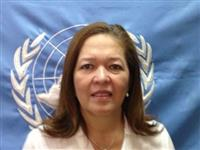PAHO/WHO Collaborating Centre Spotlight Series
Reference Number: USA-403
Official Title: PAHO/WHO CC on Water and Indoor Air Quality and Food Safety
Institution: Standards Unit, NSF International
Reference Number: CAN-57
Official Title: PAHO/WHO CC for Water Quality
Institution: Healthy Environments and Consumer Safety Branch; Water, Air and Climate Change Bureau, Health Canada
Reference Number: USA-406*
Official Title: PAHO/WHO CC for Water and Sanitation
Institution: The Water Institute at UNC, Gillings School of Global Public Health, University of North Carolina at Chapel Hill
Category 1 (SP 14-19)
Outcome 18 (SP 20-25)
Ms. Patricia Segurado, Advisor, Water and Basic Sanitation, is the PAHO staff member who supports the WHO focal point to coordinate the collaboration between the institution and the Organization.
The main activities of these Centres include: (1) providing technical advice; (2) hosting annual meetings; and (3) developing a regional report on WASH guidelines.
The Centre at NSF International supported the revision of the chemical aspects of the WHO Guidelines for Drinking-water Quality by coordinating the revision process, hosting associated meetings, conducting literature reviews, summarizing risk assessments and developing a workplan for chemicals in drinking-water. The Centre is currently working with WHO with Round II Household Water Treatment product testing, conducting research methods testing for UV & chemical disinfectants technologies and evaluating revised test waters under the WHO International Scheme to Evaluate Household Water Treatment Technologies (the Scheme).
The Centre at Health Canada has reviewed and provided technical input on microbiological, chemical and radiological contaminants for background documents and sections of the WHO Guidelines for Drinking-water Quality.
The Centre at the Water Institute hosted the UNC Water and Health: Where Science Meets Policy annual meeting where PAHO discussed the water safety framework which involved collaboration with Argentina, Brazil, Costa Rica, and Nicaragua and shared an overview of the Sustainable Development Goals and how indicators can be better measured to analyze progress. The Centre also contributed to the first global report on WASH guidelines in health care facilities and identified there is limited information available from the Americas. Thus, PAHO decided to develop a regional report in collaboration with La Asociación Interamericana de Ingeniería Sanitaria y Ambiental to gather data. Currently, the Centre has seven countries reporting on WASH in health care facilities across the Region.
Webnotes such as these serve to inform on how CCs are contributing to the Organization’s priorities and mandates.
*CC Expired


